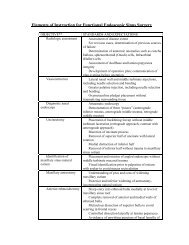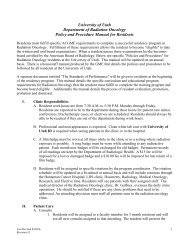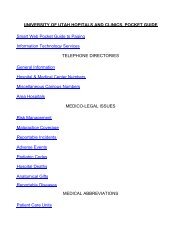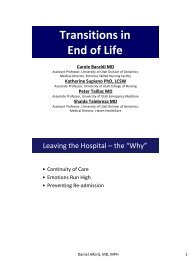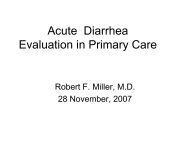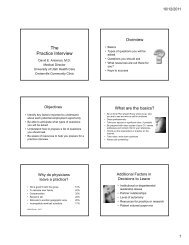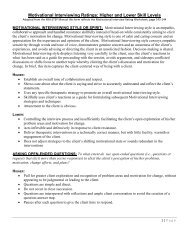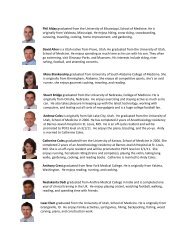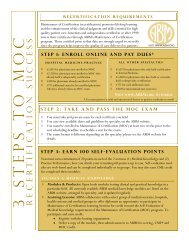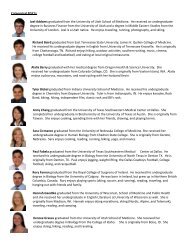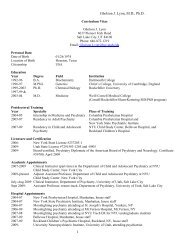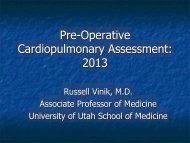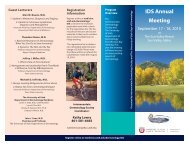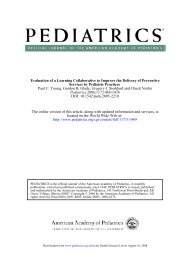Winter 2008/2009 - University of Utah - School of Medicine
Winter 2008/2009 - University of Utah - School of Medicine
Winter 2008/2009 - University of Utah - School of Medicine
You also want an ePaper? Increase the reach of your titles
YUMPU automatically turns print PDFs into web optimized ePapers that Google loves.
Distinguished AlumnI AWARD<br />
Distinguished<br />
<strong>School</strong> <strong>of</strong> <strong>Medicine</strong><br />
Distinguished Awards <strong>2008</strong><br />
The first major gift to the <strong>University</strong> <strong>of</strong><br />
<strong>Utah</strong> Health Sciences from the Spencer<br />
Stoddard Eccles family was a generous<br />
bequest given in 1965 to construct<br />
the Spencer S. Eccles Health Sciences<br />
Library. This original family gift was<br />
followed up with annual contributions<br />
to the library from the Spencer<br />
Fox Eccles and Nancy Eccles Hayward<br />
families, that resulted in an endowment<br />
that has been used to support the<br />
collection, introduce technology and<br />
provide seed money for innovative projects<br />
and programs.<br />
In 1975, the Eccles families<br />
provided a gift to the hospital for the<br />
construction <strong>of</strong> the Hope Fox Eccles<br />
Clinical Library and have made annual<br />
gifts to support an endowment. More<br />
recently the Nancy Eccles Hayward<br />
Harmon Eyre, M.D. recently retired as<br />
Chief Medical Officer and Executive<br />
Vice President for Research and Cancer<br />
Control Science at the American Cancer<br />
Society. As an American Cancer Society<br />
volunteer for over 22 years and National<br />
President in 1988, he has been instrumental<br />
in developing the Society’s<br />
priorities, including efforts to decrease<br />
smoking, improve diet, detect cancer at<br />
the earliest stage, and provide the critical<br />
support cancer patients need. Dr.<br />
Eyre guided efforts to enhance and focus<br />
the Society’s research program,<br />
upgraded its advocacy capacity, and<br />
Family donated<br />
$100,000 to provide<br />
an endowment for the<br />
library’s Open Reserve<br />
Collection, which<br />
includes core health<br />
sciences textbooks.<br />
In 2005 the family<br />
continued its generous<br />
support for the Health<br />
Sciences in <strong>Utah</strong> by<br />
Spencer and Cleone<br />
making a personal<br />
gift <strong>of</strong> $7 million to<br />
provide major funding<br />
for the Spencer F. and Cleone P. Eccles<br />
Health Sciences Education Building.<br />
This facility provided much needed<br />
classrooms, labs, and training facilities<br />
for the medical school and for all<br />
Sr. V.P. <strong>of</strong> Health Sciences, Lorris A. Betz, M.D., Dean David Bjorkman, M.D.,<br />
and Harmon J. Eyre, M.D. ‘66<br />
14<br />
SERVICE AWARD<br />
oncentrated community cancer<br />
control efforts in areas where they<br />
were most effective.<br />
Previously he had a successful<br />
academic career as a medical oncologist<br />
at the <strong>University</strong> <strong>of</strong> <strong>Utah</strong>, where<br />
he served as Associate Chairman <strong>of</strong><br />
Internal <strong>Medicine</strong> and Deputy Director<br />
<strong>of</strong> the Huntsman Cancer Institute. He<br />
has been recognized for his service to<br />
numerous pr<strong>of</strong>essional societies, government<br />
groups, and voluntary health<br />
agencies in the United States<br />
and abroad.<br />
Spencer F. Eccles family representing the Spencer Stoddard & Hope Fox Eccles Family<br />
other students in health sciences<br />
specialties. This state-<strong>of</strong>-the-art building<br />
has greatly benefited the training<br />
<strong>of</strong> the next generation <strong>of</strong> health care<br />
providers for <strong>Utah</strong>.<br />
Distinguished<br />
Alumni Award<br />
This award is presented<br />
annually to a graduate<br />
<strong>of</strong> the <strong>School</strong> <strong>of</strong> <strong>Medicine</strong><br />
who exemplifies the practice<br />
<strong>of</strong> medicine. Achievement<br />
is recognized through excellence<br />
in clinical practice,<br />
academic activities and<br />
research accomplishments.<br />
Distinguished<br />
Service Award<br />
This award recognizes<br />
individuals, both alumni<br />
and non-alumni, who<br />
have made outstanding<br />
contributions to the school,<br />
the community, and the<br />
practice <strong>of</strong> medicine.<br />
Awards<br />
Student Life<br />
Twain, Thailand, and Tuberculosis<br />
By Anne Bennett (MSIV)<br />
“Travel is fatal to prejudice, bigotry,<br />
and narrow-mindedness . . . Broad, wholesome,<br />
charitable views <strong>of</strong> men and things<br />
cannot be acquired by vegetating in one<br />
little corner <strong>of</strong> the earth all one’s lifetime.”<br />
Such words written by acclaimed American<br />
author, Mark Twain have also proven their<br />
relevance in the study and practice <strong>of</strong><br />
medicine. “Broad, wholesome, charitable<br />
views <strong>of</strong> men” is what is needed today<br />
for success in the medical pr<strong>of</strong>ession<br />
and frequently “prejudice, bigotry, and<br />
narrow-mindedness” is still the platform<br />
upon which resistance to progress is<br />
launched. Many <strong>of</strong> the international programs<br />
at the <strong>University</strong> <strong>of</strong> <strong>Utah</strong>, including<br />
The Thailand International Elective (TIE5),<br />
are founded on these ideas and strive to<br />
instill training in medical open-mindedness<br />
in their participants.<br />
The director <strong>of</strong> TIE5, Dr. Han Kim,<br />
repeatedly reminded me and the other<br />
traveling students that his objective was to<br />
make us uncomfortable. While he certainly<br />
succeeded, he never told us that in our<br />
discomfort we would come to love with a<br />
first hand knowledge the complexity <strong>of</strong> the<br />
human experience that makes medicine<br />
so rewarding.<br />
Thailand was the full-blown production<br />
<strong>of</strong> the script<br />
that is required<br />
reading for all first<br />
and second year<br />
medical students.<br />
Our trip brought<br />
questions and<br />
discussions to the<br />
statistics <strong>of</strong> social<br />
medicine, faces<br />
to the viruses <strong>of</strong><br />
microbiology, and<br />
an urgency to the<br />
understanding and<br />
appreciation <strong>of</strong><br />
pharmacology. In<br />
Thailand the facts<br />
<strong>of</strong> medical school<br />
came alive in real<br />
Author at Thai orphanage<br />
world presentations.<br />
The implications <strong>of</strong> lifestyle<br />
related illness was<br />
made poignantly clear<br />
during a stroll through<br />
the Red Light district<br />
in downtown Bangkok<br />
where STDs are being<br />
traded like baseball cards<br />
in elementary school.<br />
Our visit to the AIDS<br />
hospice became a devas- AIDS Hospice<br />
tating, yet unforgettable<br />
pictorial encyclopedia <strong>of</strong> the opportunist<br />
infections inflicting the victims <strong>of</strong> this viral<br />
assault. The experience <strong>of</strong> cachexia, which<br />
meant little to me as a two-dimensional<br />
word in a microbiology syllabus, is now<br />
burned into my brain as the very definition<br />
<strong>of</strong> suffering. Diseases which I had deemed<br />
only <strong>of</strong> historical significance were brought<br />
to the forefront <strong>of</strong> my concern as I learned<br />
how to diagnose leprosy in a young woman<br />
standing frightened in the clinic.<br />
The gurgle <strong>of</strong> expectorated sputum, the<br />
crackling <strong>of</strong> fibrotic lungs, and the droning<br />
monotony <strong>of</strong> an ongoing Buddhist prayer<br />
have become my new association with<br />
Tuberculosis; my previously learned triad<br />
<strong>of</strong> fever, night sweats, and weight loss now<br />
seems somewhat<br />
less impressionable.<br />
Diseases became<br />
more significant<br />
because <strong>of</strong> their<br />
devastation and, I<br />
realized, cannot be<br />
fully understood in<br />
a context devoid <strong>of</strong><br />
their implications on<br />
an individual body<br />
and soul. Our days<br />
in Thailand provided<br />
this context.<br />
Our trip to<br />
Thailand presented<br />
us with an understanding<br />
<strong>of</strong> the<br />
depth <strong>of</strong> the public<br />
health challenges facing today’s population,<br />
but the Thais were determined not to leave<br />
us without solutions. It was inspiring to observe<br />
a unique health care system from the<br />
legislative, theoretical, religious, and clinical<br />
angles. The Thais have structured their<br />
health care system on ideals <strong>of</strong> individual<br />
responsibility, equality, and efficiency, while<br />
relying on a vast network <strong>of</strong> community<br />
volunteers who educate, test, and advise<br />
their neighbors. Our month in Thailand<br />
was shaped by countless bus rides in which<br />
issues such as those mentioned above were<br />
discussed and debated regarding their value,<br />
relevance, and relation to the United States<br />
health care system. In many cases we were<br />
able to see the problems and possible solutions<br />
<strong>of</strong> the American health care system in<br />
a new light.<br />
TIE5 was not a month <strong>of</strong> comfort and<br />
ease. It was a time to explore the foundations<br />
<strong>of</strong> our future pr<strong>of</strong>essions and the<br />
systems in which we will operate. It was<br />
a time to feel sad, angry, grossed-out and<br />
uncomfortably sticky from sweat, but also<br />
a time to feel inspired by individuals and<br />
their personal triumphs. Just as Mark Twain<br />
implicated travel as a means <strong>of</strong> overcoming<br />
narrow-mindedness, so too can medicine<br />
open our minds and our hearts–but only if<br />
we embrace the vulnerability, humility and<br />
awkwardness <strong>of</strong> the situations in which it<br />
may place us. Our experience in Thailand<br />
helped us to do just that.<br />
15



